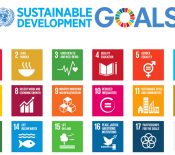Breakthrough technologies offer the opportunity for emerging countries to leapfrog others in terms of their inclusive growth path and to bridge revenue and gender divide.
ICT-enabled solutions create benefits in income, health outcomes, and time saving. This could take the form of a “doctor in your pocket” since ICT connects 1.6 billion people through healthcare applications. ICT could also increase access to “e-learning” platforms [1]; 0.5 billion people are already using e-learning methods today. For example, The Distance Education Project for Rural Schools (DEPRS), which is a project implemented by the Chinese government between 2003 and 2007 to improve the quality of basic education in rural areas of China, especially in the poorer western provinces.[2]
ICT-enabled solutions are moreover expected to have a great impact across smart manufacturing, agriculture, e-mobility, social development and education.
In this perspective, ICT solutions accelerate the implementation of SDGs, especially the ones relates to inclusive growth: -No poverty, good health and well-being, quality education, economic growth, responsible production and consumption and peace, justice & strong institutions.[3]
Ushahidi[4] for example, which means in Swahili “testimony”, is an application created in to report the violence in Kenya after the post-election conflict in 2008. Since then, thousands have used this crowdsourcing tool to defend values such as democracy and freedom. Renowned newspapers are using today Ushahidi in order to survey strikes all over the world by using data and live communication tools.
ICT can contribute to the reduction in CO2 emissions[5]. It could help other sectors reduce their emissions by up to 15% by 2030.
ICT offers additional environmental benefits beyond carbon mitigation, such as delivering better agricultural yields, enhancing energy efficiency through data collection and helping to reduce the consumption of scarce resources like water, fuel, and paper. This is especially true in the mobility sector, i.e. the connected car.
Telstra[6], for example, an Australian ICT company that provides also digital transformation services, is investing in their R&D activities to develop innovative solutions, which allow a better energy efficiency through big data and artificial intelligence. It is not the only major company that has developed such sustainable digital solutions.
The GESI is another great illustration of the commitment of the private and public sector to associate ICT in fighting climate change. It is an initiative where members are committed to share best practices for e-sustainability. The Bridge Tank was invited to the COP 22 held in Morocco were members of the Gesi Initiative emphasized their will to contribute to the reduction of their emissions and their contribution to green other sectors through ICT solutions[7].
References:
[1] 10 e-learning platforms transforming education in Africa
[2] The International of Review in Research in Open and Distributed Learning
[3] UN – Sustainable Development Goals
[5] GeSI-Building a sustainable world through responsible, ICT-enabled transformation
[6] Telestra – Technology and the energy opportunity
[7] The Bridge Tank – Our take on the Low Emission Solutions Conference – COP 22

